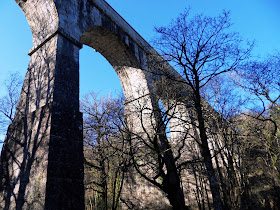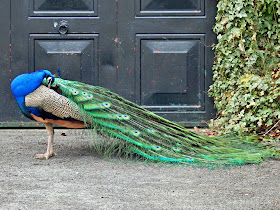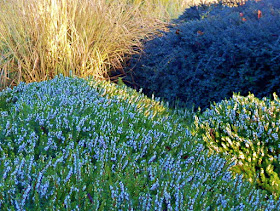▼
Friday, 31 January 2020
The Luxulyan Valley Cornwall
An interesting place to walk in Cornwall is the Luxulyan Valley, even if it can be a touch cold in winter - icicles above! It is considered to be somewhere of natural beauty.
One of it's attractions for me is the 100 feet high viaduct which is also an aqueduct. It has 10 arches made of Cornish granite and stretches for some 650 feet in length.
We scrambled up the valley side to reach the top of the aqueduct. The 'roadway' across appears to have a surface of solid granite slabs but, as you walk across, there are gaps in the slabs and it can be seen that there is water running across the viaduct.
To give a little of the history of Luxulyan Valley it was once known for the production of granite and industrial minerals. This was during the 19th century.
The impressive viaduct was dreamed up by the imagination of Joseph Treffry. Between the 1820s and his death in 1850 Treffry's buildings, tramways, viaduct and leats transformed the valley into an area of industrial activity.
The valley became a centre for granite quarrying, copper and tin mining and also china clay and stone production.
Times have now moved on and we are left with a lovely area for walking.
Water seems to be flowing everywhere along leats. A leat being an artificial waterway or aqueduct made for supplying water to industry.
In 2006 the valley's copper mining association led it to being inscribed as part of the Cornwall and West Devon Mining Landscape World Heritage.
All in all an interesting place to walk ...
… a final look at the Luxulyan viaduct.
For a good sized map of the valley by The Friends of Luxulyan Valley please click here.
For another valley walk with a viaduct and 33 photos go to: 33 Photos: A Circular Walk Based On Gover Valley, St.Austell, Cornwall
Tuesday, 28 January 2020
A Peacock Seen While Walking - Are Peacock's Feathers Lucky or Unlucky?
As you may have gathered from my blog posts I like to walk, wherever I am. You never know what you may see - even a peacock or two!
My wife and I were walking along a normal sort of road, with average houses and in the front garden of one of the properties was a peacock. Most unexpected.
The bird was happily preening himself and didn't notice us at first.
When the peacock did spot us he seemed to get into a bit of a tiswas and his feathers seemed out of control
Then came the full fan tail in all its glory, quite magnificent and enough to entice any passing peahen.
I don't know if the peacock actually lived in the modest garden, next to the garage door, as seen in the photos. Perhaps he was also on a walk and felt like a short break.
It's a strange old world. Straight away I thought of my mother, who is no longer with us.
I remembered how as a boy of six or seven she took me to London Zoo. We lived with my father in west London at the time.
Having always loved animals it was a great day out. At the zoo we saw peacocks and a couple of feathers were on the ground but out of reach. I so wanted one of those feathers. One of the zoo keepers was nearby and my mother asked if we could have one of the feathers.
He said he wasn't supposed to let anyone have them but he still wrapped one in some brown paper and gave it to me. I was so excited.
I took the feather home but my father said that peacock feathers are unlucky and he didn't want it indoors. I didn't fully understand this but, being an only child, I did get my way and the feather was placed by the living room mirror.
The feather remained there for a while and then, suddenly, it was gone. I presumed some sort of magic must have happened.
I have read that peacock feathers are deemed as being unlucky in England because the feather represents the evil eye - so the devil is watching.
In many countries though, the feather is believed to be sacred. In some Buddhist ceremonies they represent purity. As in life, it's up to us what we want to believe.
I also saw the peacock below when we ventured into deepest Devon. He was in the garden of a restaurant along with two peahens.
Saturday, 25 January 2020
A Flavour of the Beautiful Pinetum Gardens, Cornwall : 20 Photos
I'm following on from my previous post about Pinetum Gardens, Holmbush, St.Austell, Cornwall. Today we have a further 20 photos of the gardens.
I thought their office was quite cute, with the thatched roof - and who can resist a duck pond.
The 30 acres of gardens include ten individual, different gardens from around the world with, an array of plants and flowers. Being January there obviously wasn't so many flowers on display, but lots more to explore.
There are seats scattered around the gardens and the paths are wheelchair friendly.
Though, as mentioned, there aren't too many flowers on display in winter I still found the following colourful displays.
Lots of space for children and dogs on leads.
Amid the gardens there are holiday cottages.
I believe seven in total. The cottage below is called Moongate 7 and was a stone barn in a former life.
Plenty of trees ...
… of various kinds.
The spiders can be big in Cornwall, so go careful if you notice a spider's web.
A lovely lake at the far side of the gardens ...
… with ducks and geese. The geese are wild so might not always be seen at the lake.
The lake looks quite special on a sunshine day.
There's a small plaque by the lake with one of Hilaire Beloc's poems :
The Waterbeetle
The waterbeetle here shall teach
A sermon far beyond your reach;
He flabbergasts the Human Race
By gliding on the water's face
With ease, celerity and grace;
But if he ever stopped to think
Of how he did it he would sink.
Walking away from the lake a bell ...
… and an old building.
Then it's into the Japanese Garden.
Japanese style gardens always appeal to me, they have a certain calmness and tranquillity.
And that was the end of my visit to Pinetum Gardens. Much more to see though than in my photos. I enjoyed my visit and will definitely return in the Spring - or maybe sooner.
The final photo is the driveway from the car park leading to the A390, Holmbush Road.
Other Gardens Nearby:
Cornwall's Eden Project With The world's Largest Indoor Rainforest - Plus Much More
Lost Gardens of Heligan - Voted UKs Top Visitor Garden - 22 Photos
Wednesday, 22 January 2020
Pinetum Gardens, Holmbush, St.Austell: 30 Acres of Trees, Plants and Flowers
On Sunday we visited Pinetum Gardens, Holmbush. We hadn't been there for about seven or eight years and were quite impressed.
Everything seemed so much improved than I remember. Best of all, as you will see by the photos, there was colour and flowers on display. Great to see in January.
There are some 30 acres to explore and they claim that they have one of the largest plant collections in the country.
There are ten different style gardens within Pinetum such as: a Cornish Country Garden, Japanese Garden, Woodland Garden and so on.
There is lots of openness, so plenty of room for children to run free. We had our grandchildren with us. I think they enjoyed the rope ladder most as they were able to climb high in a tree.
We also had our son's dog with us - a red fox labrador - yes, dogs are welcome too.
There are ponds and ducks, green fields, mature trees and much, much more.
I'll do another post on Pinetum Gardens, with photos of the trees, open spaces and so on.
Pinetum Gardens is on the A390 Holmbush Road, between St.Austell and St.Blazey, Cornwall.
Also see: A Flavour of the Beautiful Pinetum Gardens, Cornwall : 20 Photos
Sunday, 19 January 2020
Pentewan Harbour, Beach and Village, Cornwall
Following on from my previous post. After walking through the woods we reached the small village of Pentewan.
Pickle Cottage above was once a fisherman's home - but this was way back as the cottage was built in 1823. It's now a holiday let.
More village cottages below.
Soon the old harbour comes into view.
We soon reached the far end of Pentewan beach. As you can tell it's was a chilly old morning!
Pentewan has a long, sandy beach, even more so when the tide is out.
At this section of the beach there are the remnants from the time when Pentewan was a busy harbour.
Back in the late 1800's and early 1900's Pentewan would have been a hive of activity. China clay and various metals were exported worldwide from here in sailing ships.
There is a photo of the harbour in days of old on my blog post Pentewan: Comparing How It Looked In 1900 With Today.
Pentewan harbour is now land locked ...
… but still with a wide expanse of water.
Bits and pieces remain from when it was a working harbour.
Having walked along the beach and around the harbour we returned to the village.
The road leading out of the east side of the village is narrow and steep. If driving a car you have to shut your eyes and hope for the best - well, sort of.
We wandered through the village, passing Piskey Cove ...
… and The Rocks and then joined the footpath to retrace our steps as in my previous post. I guess our Sunday morning walk was just over 3.5 miles. So not too strenuous for a before dinner stroll.





























































